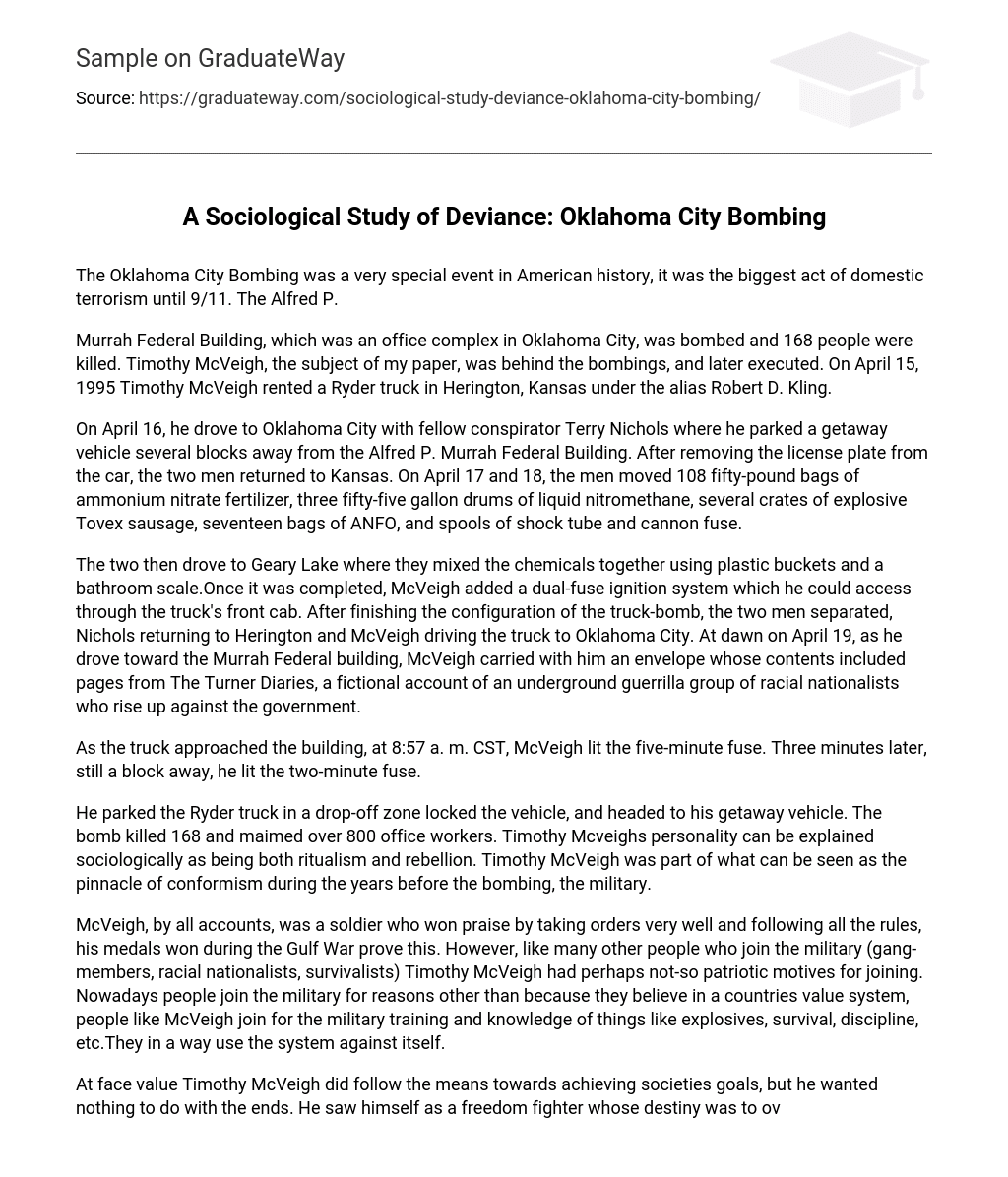The Oklahoma City Bombing, considered the biggest act of domestic terrorism until 9/11, has a significant role in American history. The Alfred P.
The Murrah Federal Building, an office complex in Oklahoma City, was targeted in a bombing incident resulting in the death of 168 individuals. Timothy McVeigh, the focus of my research, was responsible for the bombings and subsequently faced execution. Specifically, on April 15, 1995, Timothy McVeigh obtained a rental Ryder truck in Herington, Kansas using the false name Robert D. Kling.
On April 16, the individual and his accomplice Terry Nichols went to Oklahoma City. They left a car that they could escape in a few blocks away from the Alfred P. Murrah Federal Building, after taking off its license plate. They then went back to Kansas. On April 17 and 18, they moved a total of 108 fifty-pound bags of ammonium nitrate fertilizer, three fifty-five gallon drums containing liquid nitromethane, several crates holding explosive Tovex sausage, seventeen bags of ANFO (ammonium nitrate fuel oil), as well as spools of shock tube and cannon fuse.
Geary Lake was where they mixed the chemicals, using plastic buckets and a bathroom scale. McVeigh added a dual-fuse ignition system to the truck’s front cab. Once they finished setting up the truck-bomb, they each went their separate ways – Nichols returned to Herington while McVeigh drove the truck to Oklahoma City. On April 19th morning, as he made his way towards the Murrah Federal building, McVeigh carried an envelope with him. The envelope contained pages from The Turner Diaries, a fictional tale about a secret group of racial nationalists rebelling against the government.
At 8:57 a.m. CST, Timothy McVeigh ignited the five-minute fuse as the truck neared the building. While still one block away, three minutes later, he lit the two-minute fuse.
He left the Ryder truck in a specified area, secured the vehicle, and made his way to his escape vehicle. The explosion caused the death of 168 individuals and left over 800 office workers with severe injuries. In terms of sociology, Timothy McVeigh’s personality can be understood as a blend of ritualism and rebellion. Prior to the bombing, McVeigh’s involvement in the military can be considered a prime example of conformism during that era.
McVeigh, according to reports, demonstrated obedience and adherence to rules as a soldier, as evidenced by his medals earned in the Gulf War. Nonetheless, similar to other individuals who enlist in the military, such as gang-members, racial nationalists, and survivalists, McVeigh potentially had motives for joining that were not entirely patriotic. Nowadays, people enlist in the military not only because they have faith in a nation’s values but also to acquire military training and knowledge in areas like explosives, survival skills, and discipline. They exploit the system in some ways.
Timothy McVeigh initially appeared to be working towards societal goals but vehemently opposed the desired results. He saw himself as a freedom fighter with a mission to overthrow the US Government. Before joining the military, McVeigh actively participated in the survivalist movement known for its anti-government actions and beliefs. He shared these convictions and was motivated by the FBI/ATF killings in Waco, Texas, and Ruby Ridge.
McVeigh utilized his conformity and ritualism abilities to enact an act of rebellion due to his belief in the presence of an injustice that demanded retribution. Similar to fellow survivalists, he disdained materialism and a powerful government, perceiving them as morally erroneous, and aimed to establish a fairer system. Eventually, his military adherence transcended into rebellion as he, akin to numerous rebels, sought a cause worth advocating.





